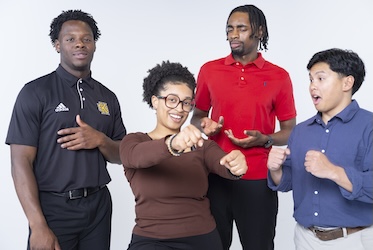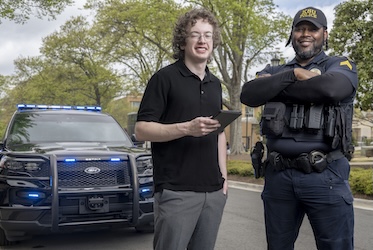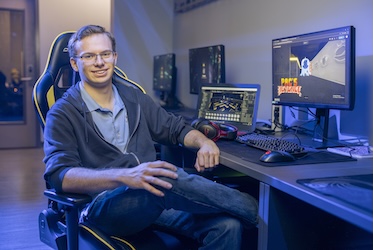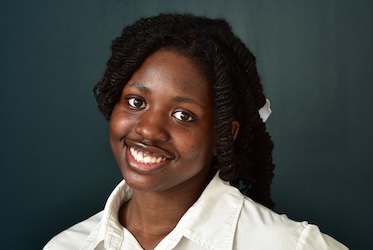
Connecting Through Computing
KENNESAW, Ga. | Oct 1, 2019
Hackathon links KSU students with local industry
In its largest event to date, more than 150 students in Kennesaw State University’s College of Computing and Software Engineering (CCSE) competed in the third annual Hackathon, providing participants a unique opportunity to utilize their computing skills to solve problems faced by Atlanta area companies.
Teams were judged by the sponsoring companies and awarded first-, second- and third-place prizes in each challenge. In total, more than $18,000 in prize money was available with first-place teams winning $500 per team member. The event was open to all students pursuing degrees in CCSE.
“As our college grows relationships with local companies, this is one of the key areas where they wish to engage with us,” said Dawn Tatum, CCSE industry liaison and internship coordinator and senior lecturer of information technology. “Our industry partners really like the interaction they get from participating in Hackathon because it connects them directly to our students and allows the companies to see their talent firsthand.”
The event is equally beneficial for the competitors, said Rebekah Roepke, a computer science student who volunteered in the first two iterations of the Hackathon. Competing for the first time this year, she and her teammates finished third in the MagMutual challenge. Currently interning with InComm, Roepke said the Hackathon gave her a chance explore other industries in a way she might not have been able to otherwise.
“While I already have an internship, I thought I could really benefit by seeing what kinds of tools other companies are using,” she said. “Being able to participate in one-on-one sessions with professionals allows us to start thinking about the ways we can approach those industries and opens us up to potential careers. We can begin to understand what skills they are looking for and in return make ourselves more marketable.”
“Sometimes companies can get stuck because they have always approached a problem a certain way, but bringing together people with different backgrounds is another way to find unique solutions,” he said. “I’m hoping that I’ll be able to take that exposure and look at my problems at work with a fresh perspective.”
Though he never had a chance to participate himself, KSU alumnus Stephen Cain returned to his alma mater this year as a mentor for Anthem. Citing his profound experience studying under Tatum in the information technology degree program, he was compelled to lend his expertise as a mentor in this year’s Hackathon in hopes he could inspire the next wave of KSU graduates.
“I think it’s cool to show the students that I was in their position just two years ago,” said Cain, a desktop management analyst at Anthem. “I think that shows to them that as soon you graduate you can be right where I am. I like to share notes with them to let them know where they should put their focus because sometimes those things don’t sink in until after you graduate. I try to remind them the small things are important.”
A total of 15 teams were awarded prizes on the final day of the Hackathon:
Anthem
First place – Swetha Adoni Prasad, Kavyasree Bezugam and Charishma Macherla
Second place – Caitlyn Murphy, Lydia Vaine and Alex Henson
Third place – Adnan Rashied, Jennifer Nguyen and Harriet Haisty
Equifax
First place – David Blunk, Andrew Goeden and Nicholas Capparelli
Second place – Karl Kevin Tiba Fossoh, Victor Youdom Kenmoe and Jordan Giovanni Bamou Nana
Third place – Andrew Johnson, Quinton Taylor and Adam Salam
HPCC Systems
First place – Dakota Lance, Leeford Nduru and Daniel Rimmel
Second place – Himaja Sri, Merlyn Sequeira and Vannel Zeufack
Third place – Robert Mitchell, Matthew Virga and Caleb Mauldin
InComm
First place – Hye Kang, Shinae Choi and Sri Mallapragad
Second place – Anthony Phan, Noah Gardner and Jiaming Li
Third place – Alex Manzer, Brandon Tedeschi and Mustak Ahmed
MagMutual
First place – Alec Graves, Nihad Kalathingal and Song Chung
Second place – Asa Bennett, Walker Sasser and Nicholas Green
Third place – Rebekah Roepke, Peter Hansen and Ava Podrazhansky
—Travis Highfield
Photography by Jason Getz
Related Stories

Kennesaw State to revive bathtub race tradition with new video game

Kennesaw State student develops AI tools to help first responders diagnose behavioral health issues

Kennesaw State computer game design student launches studio, first video game

Kennesaw State student integrates artificial intelligence into architectural design education
A leader in innovative teaching and learning, Kennesaw State University offers undergraduate, graduate, and doctoral degrees to its more than 47,000 students. Kennesaw State is a member of the University System of Georgia with 11 academic colleges. The university’s vibrant campus culture, diverse population, strong global ties, and entrepreneurial spirit draw students from throughout the country and the world. Kennesaw State is a Carnegie-designated doctoral research institution (R2), placing it among an elite group of only 8 percent of U.S. colleges and universities with an R1 or R2 status. For more information, visit kennesaw.edu.

















